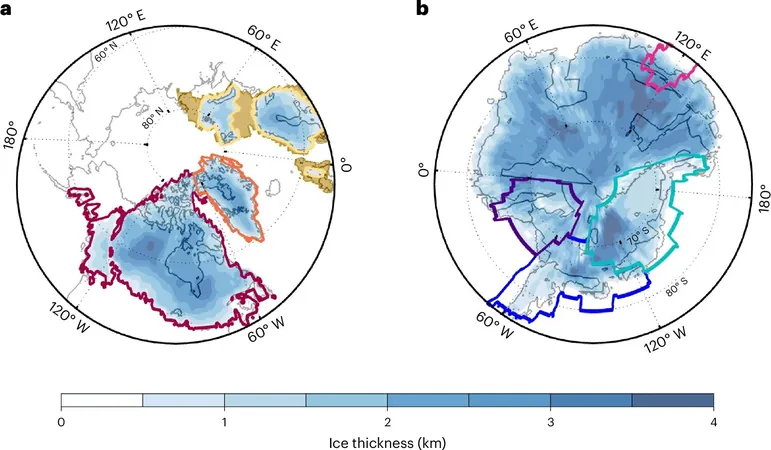
Unveiling the Secrets of Earth’s Ancient Ice: How a New Model Reveals Dramatic Sea Level Changes After the Last Ice Age!
2025-03-24
Author: Daniel
Introduction
Around 14,500 years ago, the Earth was undergoing a profound transformation as the last ice age drew to a close. Suddenly, a cataclysmic sea level rise of up to 65 feet occurred within a staggering time frame of just 500 years, a phenomenon now known as Meltwater Pulse 1a. This pivotal event, caused by the rapid melting of continental ice sheets, has left scientists scratching their heads about which specific ice sheets contributed most to this global deluge.
Fortunately, researchers from Brown University have taken a giant leap forward in uncovering the mysteries of Meltwater Pulse 1a. Utilizing a refined physical model of sea-level dynamics, their groundbreaking study—published in the esteemed journal *Nature Geoscience*—has begun to demystify this ancient catastrophe.
Reconstructing the Past: The Mechanics of Sea Level Change
The scientists embarked on a journey to reconstruct sea level fluctuations by examining ancient shorelines and ocean sediments. These sediments, rich in fossil corals and other biological markers, provided clues to the timing and magnitude of past sea level changes. Once they established a timeline, the team employed a technique known as sea level fingerprinting. This remarkable method reveals that sea level changes are not uniform across the globe. The gravitational pull of melting ice sheets influences how water levels rise or fall in different areas, relying on the specific source of the meltwater.
For instance, as massive ice sheets melted, the changes in gravity affected how ocean water was redistributed. Near the melting ice sheet, sea levels could even decrease as water was drawn away, while regions farther from the melt, such as the tropics, experienced significant increases in sea level.
Moreover, melting ice sheets affect the Earth’s crust, which rebounds and shifts in response. This intricate interaction is vital to understanding past and future sea level dynamics, but previous studies had mostly considered only rapid elastic deformation—ignoring long-term viscous deformation that can occur over centuries.
Brown University researchers challenged this notion, showcasing through new data that viscous deformation can have significant effects much sooner than previously believed. “The implications of our research suggest that the dynamics of our planet’s crust and mantle have more immediate consequences for sea level changes than we thought,” notes Harriet Lau, an assistant professor and co-author of the study.
New Insights on Meltwater Pulse 1a
The revised model produced by Coonin and her team posits a fresh interpretation of the Meltwater Pulse 1a event. They propose that the initial melting of the Laurentide Ice Sheet contributed approximately 10 feet to the sea level rise, followed by an impressive 23 feet from Eurasia and another 15 feet from West Antarctica. This nuanced understanding not only paints a clearer picture of the past but also reshapes how scientists approach the future.
Previous studies often pointed to a singular or competing source for the meltwater—either North America or Antarctica—but failed to consider interconnections. Coonin’s work suggests that a more comprehensive modeling approach changes everything: “Using the right physics can dramatically influence our predictions about sea levels.”
Given the current climate crisis and the rapid melting of the Greenland Ice Sheet, these findings raise urgent questions about the future of ice sheets worldwide and the potential for similar cascading effects. Are we witnessing the dawn of a new era in climate science? Understanding how today’s ice sheets interact could be crucial in predicting the outcomes of our changing climate.
With more research ahead, the implications of this study could redefine our understanding of ice sheet dissipation and sea level rise. What secrets will the Earth still reveal to us about our planet's climatic past and future? One thing is certain: the revelations from this study could be just the tip of the iceberg!




 Brasil (PT)
Brasil (PT)
 Canada (EN)
Canada (EN)
 Chile (ES)
Chile (ES)
 Česko (CS)
Česko (CS)
 대한민국 (KO)
대한민국 (KO)
 España (ES)
España (ES)
 France (FR)
France (FR)
 Hong Kong (EN)
Hong Kong (EN)
 Italia (IT)
Italia (IT)
 日本 (JA)
日本 (JA)
 Magyarország (HU)
Magyarország (HU)
 Norge (NO)
Norge (NO)
 Polska (PL)
Polska (PL)
 Schweiz (DE)
Schweiz (DE)
 Singapore (EN)
Singapore (EN)
 Sverige (SV)
Sverige (SV)
 Suomi (FI)
Suomi (FI)
 Türkiye (TR)
Türkiye (TR)
 الإمارات العربية المتحدة (AR)
الإمارات العربية المتحدة (AR)